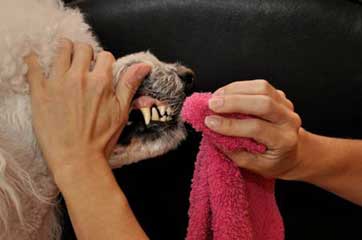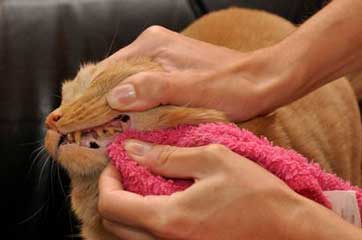Pet Dental Care: No More Bad Breath!
by Dr. Rachel Addleman, DVM, DiplABVP, CVA
Veterinarian and Certified Veterinary Acupuncturist, Dr. Addleman has advanced training and Board Certification in
feline medicine. She practices in Houston, Texas and can be found at
AnimalFixer.com


Lifting up the upper lip with one finger, brush the teeth with either a
pet toothbrush or a wet washcloth.
Only use a pet toothpaste that is safe to swallow.
Take a sniff of your pet’s breath. Stick your nose down, lift up their
lip, and take a deep whiff. Does the breath smell sweet and faintly like
food? Or smell really ripe like a garbage truck? People are told to
visit their dentist twice a year. What should you do to keep your pet’s
breath smelling fresh and healthy?
Imagine not cleaning or flossing your own teeth for years. Even if you
were to eat just dry food, you’d still have bad dental hygiene. Some
people are under the assumption that feeding dry food is all that is
required for their animal’s dental needs. A full 85% of pets have dental
disease by the time they are three years old. In addition to local mouth
pain and infection, bacteria accumulating in the mouth can affect other
parts of the body causing infections in the heart, liver, or kidney.
Sometimes pets stop eating or paw at their mouth, but most of the time
dogs and cats do not stop eating or show any outward sign of pain. In
fact, oral infection and disease is often ignored because the pet is
still eating. If that same infection were to be on the animal’s skin,
owners would be in the clinic every week to get it cleared up!
Pet parents are generally surprised when they are shown broken teeth,
bleeding gums, heavy tartar, and painful exposed roots. In cats, chronic
sneezing or nasal discharge can indicate an abscessed upper tooth.
In addition to a full dental cleaning by your veterinarian, antibiotics
may be used to destroy bacteria causing disease and bad breath. Once the
mouth is clean and healthy, using a special tartar control diet and
products approved by the Veterinary Oral Health Counsel (VOHC) can help
to keep your pets mouth clean. Check out www.VOHC.com for a list of
accepted products.
Some pets can be trained to accept tooth brushing. Tooth brushing, even
three times a week, has been shown to be helpful in reducing the plaque
level. Use a pet toothpaste as animals need products that are safe to
swallow. The act of brushing with plain water, even without toothpaste,
is helpful.
Oral rinses that contain chlorhexidine can be helpful. These can be
either added to the water or apply directly to your pet’s gums. Chew
treats that have chlorhexidine in them can help, too. Healthy mouth
anti-plaque water additive is VOHC approved. Maxi/Guard ® Oral Gel is a
VOHC approved zinc ascorbate product shown to reduce plaque and
gingivitis, and can be purchased over the counter.
Greenies ® Chews, Vetradent ® chews marketed as Bluechews, Purina
Veterinary Diets ® Dental Chews, and Bright Bites and Checkups Chews for
Dogs by Diamond Foods, Inc. are popular treats sold over the counter to
help with tartar build-up and are all approved by VOHC.
The best part about keeping your pet’s mouth clean is that you can
continue to enjoy their kisses. And your friends who come to visit will
appreciate it, too.
